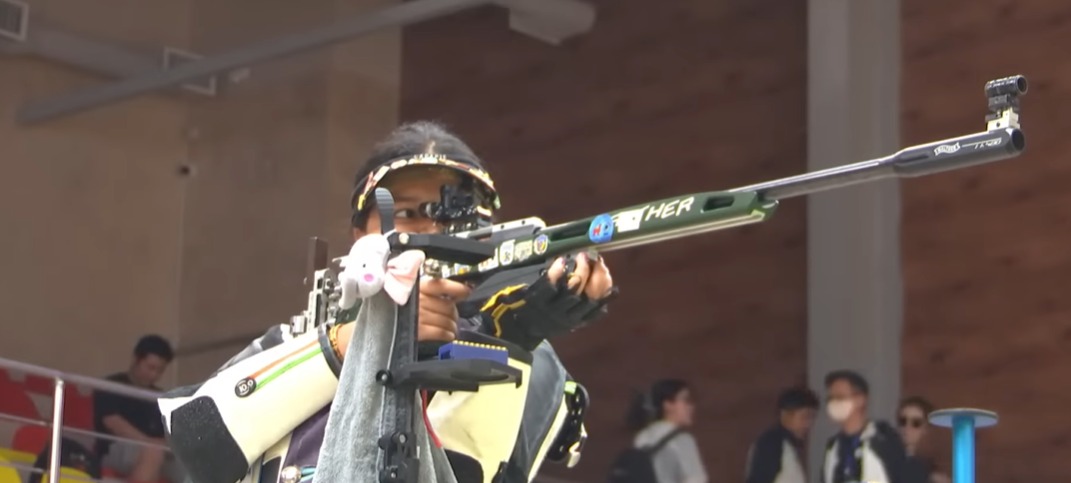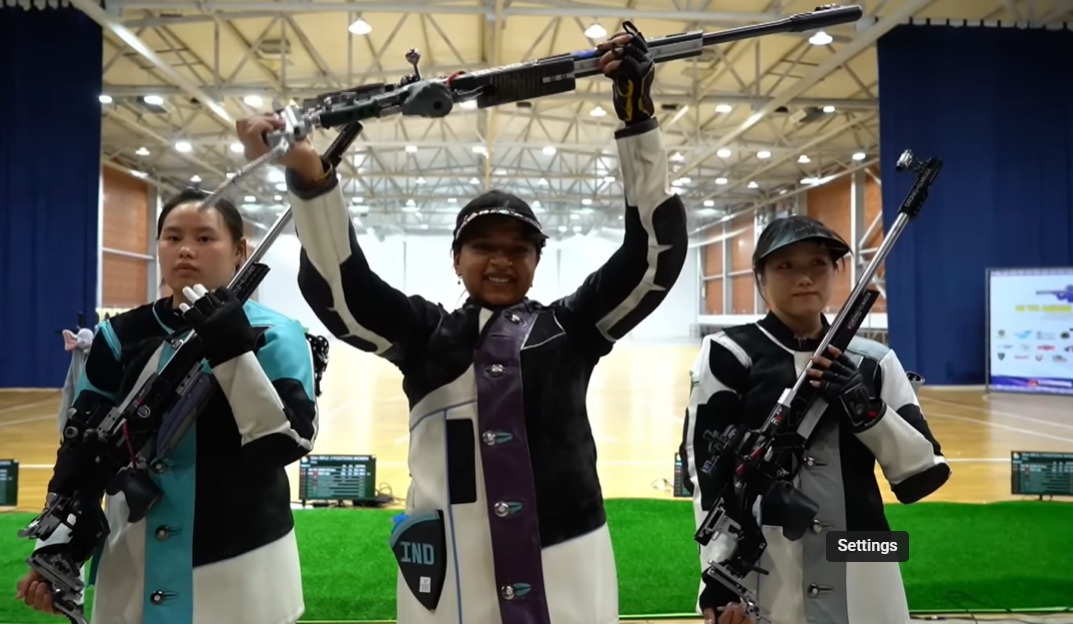
Sift Kaur Samra made the Asian Championships in Kazakhstan her own by winning double gold. In a tense final, she once again handled the pressure superbly, edging China’s Yang Yujie by 0.4 points to clinch the individual gold. Alongside Anjum Moudgil and Aashi Chouksey, she also secured the team gold with an aggregate of 1753 points.
In an exclusive interaction with RevSportz, Sift Kaur revealed what was going through her mind before the finals, how she deals with pressure, how academics helps her in sport, and why she is missing rajma rice. Here are the excerpts from her interview.
Trisha Ghosal (TG): First of all, congratulations for your superb performance. How special is this victory compared to the others? Because you have a habit of winning gold medals. Where would you rate this one?
Sift Kaur Samra (SKS): Thank you so much. This Asian Championship is really special because, after the match, my mother called and told me, “Do you know this is your first ever individual gold medal in the Asian Championship?” And I was like, oh, okay. After that, I was even more excited.
Honestly, in the camp, my shooting wasn’t going that well. Maybe because it was very humid in India. I felt it would be difficult to win a medal. But when we landed here, even though it’s hot, it’s very dry and windy. The men’s and women’s scores had big variations because of the wind. Still, overall, the Indian shooting team did a fabulous job. And I love being called the Golden Girl!
TG: When you’re not shooting well in camp but then land at an important event, how do you deal with the pressure, especially since you’re contributing not just individually but also to the team?
SKS: This is one of the championships where we also get a team medal. So yes, there’s always a little bit of pressure, we have to give 100%, so that at least as a team, we secure one medal.
Individually, it’s different. My match was up and down: very good first 10 shots, then average, then good again. At the end, I had only three shots left and it was very windy. I got nervous, so I looked back at my teammate Surabhi, who was shooting prone, and asked if I was in the top eight. She got scared and asked, “Whom should I call?” (laughs). Eventually she told me, “You are second.” That gave me confidence, and I relaxed for the last three shots.
When I realised I had the gold, I was very happy. The team pressure was done. Now it was about my individual medal. And yes, all of us, me, Aashi and Anjum Didi, felt that extra pressure that our scores should not let the team down. But we managed it.
TG: In the final, your difference with China’s Yang Yujie was just 0.4. What goes through your mind in those moments?
SKS: At one point, with two or three shots left, I had a 0.9 lead. I thought, okay, just relax, outer 10s are enough. But then I shot a 9.0 and panicked—“Oh no, I don’t want to finish with silver!” She then shot an 8, I shot 10, then I shot 9.4. I thought it was slipping. But then she shot 8.7. I felt, “Okay, God also wants me to win gold.” (smiles)
For the last shot, I was very calm and in my process. I told myself, this has to be a 10. It was very close, our heartbeats were racing, but I pulled through.
TG: From the outside, it looks like your standing position is your strength, and often you make comebacks there. Do you also think standing is your strength?
SKS: I know standing is my strength, but I never want to be overconfident. Because on any given day, it may or may not work for me. So, whenever I move to standing, I always pray, Babaji, now it’s only you and me, please take me to the top three. In finals, our heartbeat is already high, and even a slight movement can shift the shot to a 9 or 8. So I stay alert, not overconfident, and make sure not to commit silly mistakes.
TG: Unfortunately, every time we speak, we have to take you back to Paris 2024. You had admitted you overthought the occasion. Since then, your season has been brilliant. How did you change your approach after Paris?
SKS: Simple, I just say that was not my day. My mother also told me, “It’s not that you forgot how to shoot or lost confidence. It was just not your day.” Yes, it took me time to recover because people keep saying “Olympics, Olympics.” Many athletes go into deep heartbreaks after not winning a medal. But I decided I don’t want to be like that. I want to be different. So I took it as just one day, left it behind, and moved on. Positive thinking really helps.
TG: You’ve said you limit social media use and also work with a sports psychologist. How do these help you mentally?
SKS: I’m not someone who can sit still. Even now, during this interview, I’m playing with my clutcher. So meditation is difficult for me, but I’m trying.
About social media, at my first Olympics, I wasn’t used to the hype. Before the Olympics, media and ads create huge pressure. People keep saying, “Bring a medal.” For other competitions, no one even knows until we win! So during LA, I’ve decided not to use Instagram before.
Talking to a psychologist has also helped a lot. Shooting is a precision sport, and close to the Olympics, there’s pressure from all sides. Having a psychologist gives me clarity and keeps me mentally sharp.
READ: Of healthy competition and the medal-winning moment at Asian Championships: Elavenil and Arjun
TG: You’ve also managed to balance academics and sport. You were once preparing for medicine, now doing physical education alongside shooting. How do you manage both?
SKS: Yes, I’ve just finished my graduation exams, and now I need to take admission in my next subject. My university is very supportive, they let me give exams whenever I am free from competitions. They don’t pressure me, which is a big relief. Honestly, I’ve never seen this kind of support before in my academics journey.
TG: Do you feel academics help you in handling pressure and failure differently compared to someone without that background?
SKS: Definitely. I feel sport is tougher than academics. People say, “What’s there in sports, you just play.” But trust me, getting into the top three in sports is harder than passing exams in a class of 40. Both are important, and academics give knowledge and perspective. The combination helps. When you study, it gives you relief from sport, and vice versa. It balances life.
TG: Since you’re Punjabi, I must ask, how will you celebrate this medal? Any special food requests for home?
SKS: (laughs) I still have my prone event left, so I’ll only return on the 31st. But yes, first thing after I return to India, I’ll go to my maami ji because I’m really missing her rajma rice. That’s my comfort food.

TG: Have you managed to explore Kazakhstan at all?
SKS: Not really. We’re in Shymkent and there’s hardly anything here apart from a mall and a statue visible from my balcony. That’s all I’ve seen. Shooting is like that, you go abroad but only see hotels and ranges.
TG: After the prone event, what’s next for you?
SKS: Honestly, my birthday in September! (laughs) I’m preparing for that now. After returning home, I’ll plan something special.
TG: Perfect. Then let me wish you in advance, a very Happy Birthday, Sift!
SKS: Thank you so much!
For more updates, follow RevSportz





